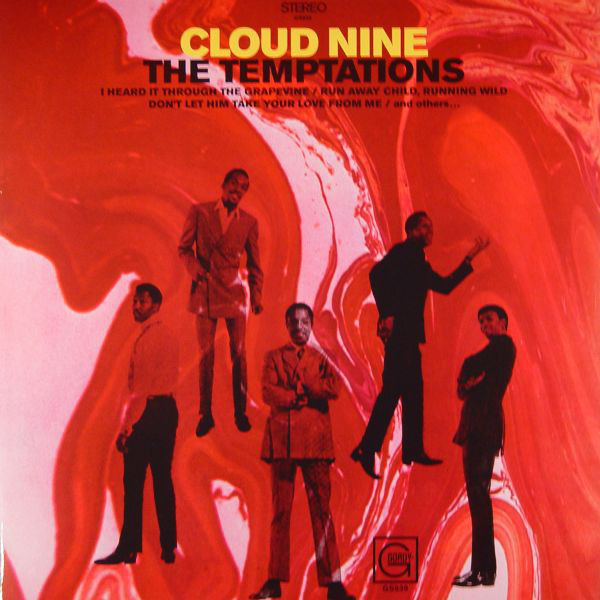Feb 1, 2018: Dennis Edwards, Temptations Lead Vocalist, Dies
by Best Classic Bands Staff
The cover of the 1969 album, Cloud Nine
Dennis Edwards, who was the first to replace one of the so-called “Classic 5” members of the popular soul vocal group the Temptations, died February 1, 2018, in Chicago, two days before his 75th birthday.
Edwards joined the Motown singing group in 1968, replacing David Ruffin, and sang lead vocal on many of their most popular hits including 1968’s “Cloud Nine” (#6 pop, #2 R&B), 1969’s “I Can’t Get Next to You” (#1 on both charts), 1970’s “Ball of Confusion (That’s What the World is Today)” (#3 pop, #2 R&B) and 1972’s “Papa Was a Rollin’ Stone” (#1 pop, #5 R&B).
Four of the original members of the group—Ruffin, Eddie Kendricks, Paul Williams and Melvin Franklin—predeceased Edwards. Only Otis Williams survives. On the group’s Facebook page, one day after Edwards’ passing, Williams wrote:
“We learned today with great sadness of the passing of our brother, Dennis Edwards. He is now at peace, and our love and prayers go out to his family. At this moment and always, we acknowledge his extraordinary contribution to The Temptations legacy, which lives on in the music. Temptations, forever.”
A report in the Feb. 6 St. Louis Post-Dispatch alleged that Edwards was the victim of abuse by his wife prior to his passing. The paper wrote: “court-filed documents allege that Brenda Edwards had attempted to suffocate the 74-year-old by holding his head facedown on a bed.” Edwards lived in St. Louis for 30 years.
The report notes that Brenda Edwards has disputed the allegations. “In a brief statement released Monday night,” it says, “she said, ‘I loved Dennis, and we were married for 18 years. I would have never done anything to harm him. These allegations are false and defamatory and will be proven as such. Until this is all over, I have no further comment.’”
Watch the Temptations perform “Ball of Confusion”
In their long career, the group enjoyed 16 U.S. Top 10 pop hits and a whopping 45 Top 10s on the R&B chart. Their first hit was the 1964 song “The Way You Do the Things You Do” which reached #11 pop and R&B, with Kendricks singing lead. One year later, they scored their first #1 pop hit, “My Girl,” with Ruffin on lead vocal.
Along with Diana Ross & the Supremes, Smokey Robinson, Stevie Wonder, the Four Tops and Marvin Gaye, the Temptations were among the biggest acts for the label empire known as Hitsville U.S.A. (The Temptations’ recordings actually came out on the Gordy Records imprint.) Soon after, they were joined by the Jackson 5, the Commodores, and more.
In 1977, Edwards was fired from the Temptations. He returned in 1980 when they re-joined Motown after a brief, and unsuccessful run on Atlantic Records. He ultimately sang with Ruffin on the group’s 1982 Reunion album.
The Temptations—including Edwards—were inducted into the Rock and Roll Hall of Fame in 1989.
Edwards was born February 3, 1943, in Fairfield, Ala., outside of Birmingham. The son of a pastor, he joined a gospel vocal group in his teens. In 1966, he signed with Motown, who briefly assigned him to the Contours. Within two years, he replaced Ruffin in the Temptations.
Edwards earned three Grammy Awards with the Temptations—Best Rhythm and Blues Performance by a Duo or Group for “Cloud Nine” for 1968, and Best R&B Instrumental Performance and Best R&B Vocal Performance by a Duo, Group, or Chorus for “Papa Was a Rollin’ Stone” for 1972. The Temptations were also honored with the Recording Academy’s Lifetime Achievement Award for 2013.
Watch the Temptations perform “I Can’t Get Next to You” on The Ed Sullivan Show in 1969
Related: Authors discuss their stunning Motown book
Temptations recordings are available for purchase here.
- Top 40 Hits in July 1966: Summer in the City - 07/07/2025
- Doc Severinsen Plays Final Concert… at 95 - 07/07/2025
- Eric Carmen Tribute Concert Will Celebrate His Musical Legacy - 07/07/2025






4 Comments so far
Jump into a conversationDavid Ruffin was not one of the founding members of The Temptations. He joined in 1964 to replace fired original member Elbridge “Al” Bryant.
Thank you, Dave. We’ve made the correction.
Such a class act. Temptations forever ♥️
If you get the chance, there’s a movie called The Temptations. Documents the highs and lows of the group from their early days up to Blue’s passing.